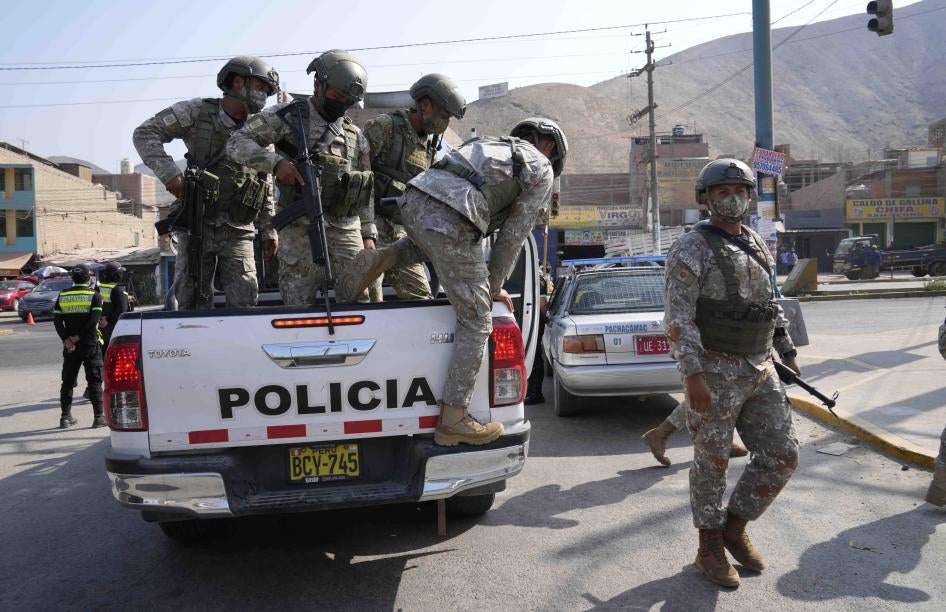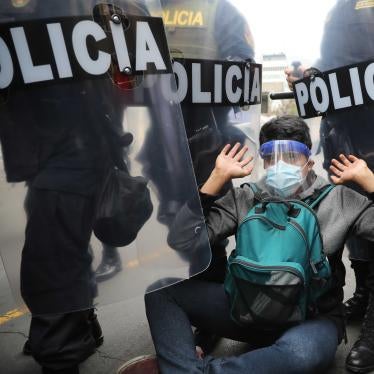(Washington, DC) – Several decrees issued by Peruvian President Pedro Castillo that suspend basic rights in certain areas of the country are disproportionate measures that open the door to abuse, Human Rights Watch said today.
On April 7, 2022, President Castillo issued a state of emergency decree for 30 days that applies to the national road network, more than 27,000 kilometers – about 17,000 miles – of main roads. The decree, which states in its preamble that it responds to “problems” created by a transportation workers strike, allows the government to deploy the Armed Forces on those roads, suspends constitutional rights to freedom of movement and peaceful assembly, and permits arbitrary arrests on the road network.
On March 28, transportation workers started a national strike against an increase in gas prices and inflation, blocking roads across the country.
This decree follows three others – issued on February 2, March 17, and April 4 – that had suspended various basic rights in the capital, Lima, and neighboring province of Callao.
“Suspending people’s basic rights and sending in troops to deal with a strike and with crime is dangerous and far out of proportion to the situation,” said Tamara Taraciuk Broner, acting Americas director at Human Rights Watch. “President Castillo should revoke the emergency decrees.”
On February 2, President Castillo decreed a state of emergency in the Lima metropolitan area and Callao “to reduce criminal acts by common criminals and organized crime, and to strengthen prevention, investigation, and police intelligence,” without providing any data showing increased criminal activity. The state of emergency, decreed for an initial period of 45 days and renewed for another 45 days starting on March 20, allows the deployment of the Armed Forces to support the police to maintain “internal order.”
It also permits arbitrary home searches and arrests, and suspends freedom of movement and peaceful assembly.
In the evening of April 4, President Castillo added an article to the decree prohibiting all residents of Lima and Callao from leaving their homes on April 5, except for workers of essential services, in response to “problems” created by the strike. The Minister of Defense said the measure was needed to prevent vandalism that, he said, a confidential report indicated would occur on April 5.
Nevertheless, thousands of people took to the streets in downtown Lima in the afternoon of April 5 in defiance of the curfew. The demonstration, which was largely peaceful, ended with attacks by a small group of protesters against government buildings, including the Lima Superior Court of Justice, looting, and clashes with police.
The decrees fail to explain what “problems” they are supposed to address and why such extreme steps are needed to fight crime or to respond to protests. They provide limited, if any, justification for the emergency measures and instead cite secret police reports.
At least five people have reportedly died in various circumstances in the context of the protests since March 28. A 13-year-old child drowned on April 1 after falling into a river while he fled police, his family said. The National Human Rights Coordinator (Coordinadora Nacional de Derechos Humanos), a coalition of human rights organizations, said that another victim was allegedly hit by a teargas canister on April 5 and an additional victim was killed by a bullet on April 6, both reportedly fired by the police. In addition, the Attorney General’s Office said that one person died because he could not reach a hospital due to protests, without providing the exact date, and another person died after being hit by a car during a demonstration on March 28.
The Coordinadora Nacional de Derechos Humanos also said dozens of protesters were injured by police. The Ministry of Interior reported that more than 20 police officers suffered injuries in Lima in the April 5 clashes.
Prosecutors should conduct prompt, thorough, and independent investigations into all these cases, Human Rights Watch said.
Under international human rights law, the authorities should protect peaceful assemblies, and not disperse them even if they believe them to be unlawful. Peaceful protests that block traffic may be dispersed, as a general rule, only if they cause serious and sustained disruptions.
The police should avoid using force unless necessary and proportionate to respond to specific incidents of violence, Human Rights Watch said.
Under article 4 of the International Covenant on Civil and Political Rights, which Peru has ratified, governments may derogate from, or suspend, some of their obligations under the covenant “in time of public emergency which threatens the life of the nation.” Derogations should be only those “strictly required by the exigencies of the situation.”
The UN Human Rights Committee, which is charged with providing authoritative interpretations of the covenant, has made clear that states of emergency may not be used as a justification to violate peremptory norms of international law, for example through arbitrary deprivations of liberty or by deviating from fundamental fair trial principles.
Similarly, article 27 of the American Convention on Human Rights allows governments to derogate from some obligations in times of “war, public danger, or other emergency that threatens the independence or security,” provided that such measures are strictly required by the emergency and consistent with other obligations under international law.
Since President Castillo took office in July 2021, he has changed his prime minister and cabinet four times amid scandals and criticism. Congress has held two votes to remove him from office, which failed. In January, the attorney general initiated a preliminary investigation of President Castillo for alleged corruption and other crimes, though it cannot proceed until the end of his presidential term due to the president’s immunity.
“Without a clear justification, the latest measures look more like an attempt to stop anti-government protests at a time when the government is facing enormous political difficulties,” Taraciuk Broner said. “President Castillo should prioritize strengthening, not undermining, the rule of law.”









